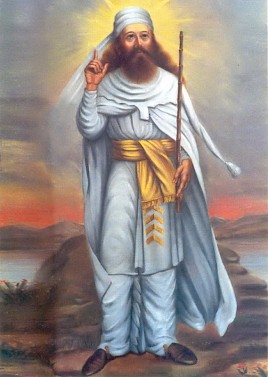Zarathustra - Livius (original) (raw)
Zarathustra (Greek Zoroaster): legendary religious teacher from Bactria, founder of Zoroastrianism.
Modern portrait of Zarathustra, inspired by a dress on a relief of Taq-e Bostan.
Hardly anything is known about Zarathustra's life. For example, it is uncertain when he lived. The ancient Greeks speculated that he lived six thousand years before the philosopher Plato and several scholars have argued for a date at the beginning of the sixth century BCE. Other scholars accept that Zarathustra is the author of the _Gâthâ'_s (a part of the holy book of the Zoroastrians, the Avesta), which they date, on linguistic grounds, in the fourteenth or thirteenth century BCE.
It is also unclear where Zarathustra was born and where he spent the first half of his life. Every tribe that converted to Zoroastrianism made up legends about the prophet's life, and nearly all of them claimed that the great teacher was "one of them". On linguistic grounds, we may argue that author of the _Gâthâ'_s belonged to a tribe that lived in the eastern part of Iran, in Afghanistan or Turkmenistan.
The _Gâthâ'_s are not a great help either. They contain some personal information, but are hardly the stuff that biographies are made of. The Denkard, a late Avestic text, contains a summary of an older biography. It contains many legends and the reliability seems not very great. The following reconstruction of Zarathustra's life is, therefore, not to be taken as the very truth.
Zarathustra was born in Bactria (or Aria) as the son of a not very powerful nobleman named Purushaspa and a woman named Dughdhova. Zarathustra was the third of five brothers. He became a priest and seems to have showed a remarkable care for humans and cattle. The family is often called Spitama, which is a honorary title meaning 'most beneficient', but was later taken for a family name.
Zarathustra's life changed when the god Ahuramazda granted him a vision. A spirit named Good Thought appeared and ordered Zarathustra to oppose the bloody sacrifices of the traditional Iranian cults and to give aid to the poor. In one of his own compositions, Zarathustra says:
Thee I conceived as holy, O Ahuramazda, when thy Good Thought appeared to me and asked me: 'Who art thou? And whose is thine allegiance?' [...]
Then I answered: 'Zarathustra am I; to the false believers a forthright enemy, but to the righteous a mighty help and joy. [...]
Thee I conceived as holy, O Ahuramazda, when thy Good Thought appeared to me. [...] A difficult thing it seemed to me, to spread thy faith among men, to do that which Thou didst say was best.note[Yasna 43.4.]
Zarathustra started to preach that there was a supreme god, the "wise lord" Ahuramazda, who had created the world, mankind and all good things in it through his holy spirit, Spenta Mainyu. The rest of the universe was created by six other spirits, the Amesha Spentas ('holy immortals'). However, the order of this sevenfold creation was threatened by The Lie; good and evil spirits were fighting and mankind had to support the good spirits in order to speed up the inevitable victory of the good.
A remarkable aspect of Zarathustra's teaching is that he employs special words to describe the demons. Their names are remarkably similar to words from the Indian Rigveda. Now it is reasonably certain that the language of the Rigveda was spoken in eastern Iran at some stage in the history of the second millennium BCE. We may assume that Zarathustra opposed the old religion, which was to flourish in the Punjab.
It was the duty of the believer to side with Ahuramazda, which was possible by avoiding lies, supporting the poor, several kinds of sacrifices, the cult of fire, et cetera. Zarathustra warned the people that there would be a Last Judgment, where the friends of The Lie were to be condemned to Hell and the pious allowed to enter Heaven (text).
This new teaching caused a conflict between Zarathustra and the priests of the god Mithra.
The Enemy has ever fought with me [...] he is most powerful. [...] O Ahuramazda, aid me; obtain for me with thy Good Thoughts his defeat.note[Yasna 39.]
There seem to have been some fights, and Zarathustra was forced to leave his country. Not even his family wanted to assist him.
<peft: 40px;"="">To what land to turn? Whither shall I go? Kinsman and friend turn from me; none is found, to conciliate, to give to me; still less the false-believing chiefs of the land. This I know, Ahuramazda, why I am powerless: because my flocks are diminished and my followers are few. Therefore I cry to Thee: Lord, look upon it.note[Yasna 46.1-2.]
Finally, Zarathustra obtained asylum from a king named Hystaspes; he may have ruled in Chorasmia or Aria. At his court, the prophet debated with the priests of Mithra; on an official gathering, they discussed thirty three questions, and Zarathustra's opinions prevailed.
Many noblemen followed the example of Hystaspes to convert to Zarathustra's new religion. From now on, Zarathustra lived at the court of Hystaspes, until he was killed at the age of seventy-seven by invading nomads. Some locate his death at Bactra (Balkh, near modern Mazâr-e Sharîf) in Afghanistan.
Zarathustra's teachings are strongly dualistic. The believer has to make a choice between good and evil. Zoroastrianism was one of first world religions to make ethical demands on the believers.
Zarathustra was not the inventor of monotheism, although several European scholars have thought so. More information can be found here.
Literature
- Mary Boyce, Textual sources for the study of Zoroastrianism (1984 Manchester).
- Peter Clark, Zoroastrianism. An Introduction to an Ancient Faith (1998 Brighton)
